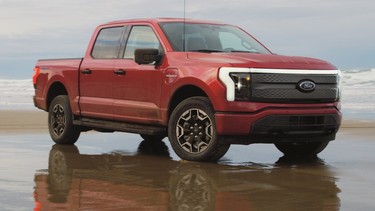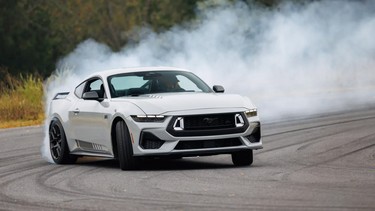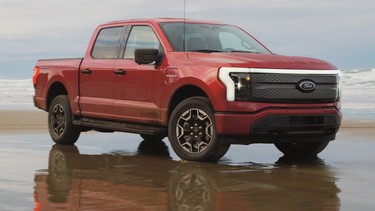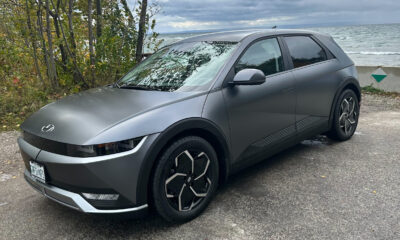Technology
2025 Ford F-150 Lightning Flunks IIHS Crash Test, Raising Safety Concerns

The recently released crash test results from the Insurance Institute of Highway Safety (IIHS) have raised significant safety concerns regarding the 2025 Ford F-150 Lightning electric vehicle (EV). Out of seven new EV models tested, only five passed the rigorous moderate-overlap frontal collision tests. The Ford F-150 Lightning, along with the Nissan Ariya, received the lowest ratings, highlighting potential risks for rear-seat passengers.
IIHS Testing Findings
In the latest tests, the IIHS simulates a moderate-overlap frontal collision by having a vehicle strike a stationary barrier at a speed of 40 miles per hour (64 km/h), with only 40% of its front end overlapping the barrier. This testing method has become crucial as recent studies indicate a higher risk of fatal injuries for belted rear-seat passengers compared to those in front seats.
The F-150 Lightning received a “poor” rating, primarily due to the significant risk of injuries to the head and neck for the rear-seat dummy. The test indicated that the lap belt slid up from its optimal position, increasing the risk of internal injuries. The shoulder belt also moved from its ideal placement on the chest to the neck, potentially exacerbating injury risks.
The Nissan Ariya fared slightly better, achieving a “marginal” rating. While it managed to control the rear dummy’s motion during the test, it still demonstrated a high risk of chest injuries. According to the IIHS, these results emphasize the need for improved safety measures in rear seating arrangements.
Role of IIHS in Safety Assessment
The IIHS has focused recent efforts on evaluating rear-seat passenger safety because most modern vehicles offer adequate protection for front-seat occupants during crashes. The organization began assessing rear-seat performance in 2022, aiming to better account for variations in shoulder belt positions, particularly for smaller passengers such as children and women.
Despite the poor performance of the F-150 Lightning and Ariya, four other models, including the Tesla Cybertruck, Chevrolet Blazer EV, BMW i4, and Volkswagen ID.Buzz, achieved the agency’s top “good” rating. The Tesla Model 3 was rated “acceptable.” None of the tested EVs, however, qualified for the IIHS’s prestigious Top Safety Pick or Top Safety Pick+ awards, reflecting ongoing concerns about safety standards across the board.
The IIHS is committed to improving vehicle safety through these stringent testing protocols. As vehicles continue to evolve, ensuring the protection of all occupants, particularly those most vulnerable, remains a top priority.
In conclusion, the crash test results for the 2025 Ford F-150 Lightning underscore the need for manufacturers to address safety shortcomings in their designs. The findings serve as a critical reminder for consumers to consider safety ratings when evaluating new vehicles, particularly in the rapidly growing EV market.
-

 World4 months ago
World4 months agoScientists Unearth Ancient Antarctic Ice to Unlock Climate Secrets
-

 Entertainment4 months ago
Entertainment4 months agoTrump and McCormick to Announce $70 Billion Energy Investments
-

 Lifestyle4 months ago
Lifestyle4 months agoTransLink Launches Food Truck Program to Boost Revenue in Vancouver
-

 Science4 months ago
Science4 months agoFour Astronauts Return to Earth After International Space Station Mission
-

 Technology2 months ago
Technology2 months agoApple Notes Enhances Functionality with Markdown Support in macOS 26
-

 Top Stories3 weeks ago
Top Stories3 weeks agoUrgent Update: Fatal Crash on Highway 99 Claims Life of Pitt Meadows Man
-

 Sports4 months ago
Sports4 months agoSearch Underway for Missing Hunter Amid Hokkaido Bear Emergency
-

 Politics3 months ago
Politics3 months agoUkrainian Tennis Star Elina Svitolina Faces Death Threats Online
-

 Politics4 months ago
Politics4 months agoCarney Engages First Nations Leaders at Development Law Summit
-

 Technology4 months ago
Technology4 months agoFrosthaven Launches Early Access on July 31, 2025
-

 Top Stories1 week ago
Top Stories1 week agoFamily Remembers Beverley Rowbotham 25 Years After Murder
-

 Entertainment4 months ago
Entertainment4 months agoCalgary Theatre Troupe Revives Magic at Winnipeg Fringe Festival





















